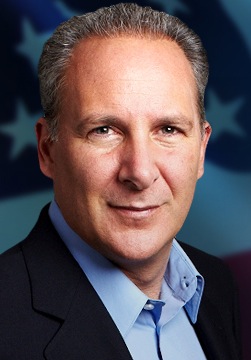Home Equity is Not Savings
Yesterday on CNBC's "Closing Bell" my bullish opponent in a "Bull vs. Bear" debate rebutted my argument that Americans saved too little by claiming that the methodology used to calculate savings was flawed as it omits the accumulation of home equity. This foolish argument, which amounts to nothing more than Wall Street's attempt to rationalize away a chronic problem, reveals a complete lack of understanding of the concept of savings, and the important role that savings plays in a free market economy.
Savings represent foregone consumption deferred to a future date. It amounts to a personal sacrifice, the deliberate postponement of immediate gratification. The saver makes his savings available to finance capital investment, which ultimately leads to increased productivity and rising standards of living. In fact, savings are the life blood of a market economy. Without savings, capital formation is impossible, and true economic growth can not take place.
While it is true that home equity may be an asset to an individual homeowner, its existence in no way adds to society's stock of savings. Home equity does not require the homeowner to forgo anything. Nor does it free up any resources to finance capital formation. In fact, the only way a homeowner can tap his equity is by accessing someone else's savings. He either has to sell his house, in which case a buyer uses his own savings (or borrows someone else's) or he refinances, in which case he access someone else's savings himself. Therefore, not only does home equity not represent savings, its existence actually represents a potential claim on society's legitimate supply of savings. To the extent that it is used to finance consumption, it actually crowds out savings which might otherwise have been used to finance capital formation.
The main reason American homeowners can access their home equity is that foreign savers are willing to lend them the money. Once foreigners come to their senses, mortgage credit will evaporate, and home equity will vanish along with it. Unlike legitimate savings that are permanent, provide real security, earn interest, and represent future purchasing power, home equity will prove ephemeral, disappearing as quickly as it appeared. From an individual perspective, counting home equity as savings is analogous to a gambler counting his chips while still seated at the card table. Having a big stack in front of you means nothing if by the end of the game you're busted.
Going from the sublime to the ridiculous, yesterday on Bloomberg Television, an "expert" proclaimed that there was no housing bubble, and chastised the press for irresponsibly scaring potential home buyers out of big profits. His conclusion regarding the absence of a bubble was based on his defining a bubble as "too much supply with wide-spread job losses." Since in his opinion none of these criteria were met, there was no bubble. How can he detect that which he can not even define? The proper definition of a bubble is "Speculative buying of appreciating assets, without regard to underlying investment returns (in the case of real estate that would be rents), solely on the anticipation of future price appreciation." This definition describes today's real estate market precisely. What this expert actually defined were two potential pins which might ultimately prick the real estate bubble, not the bubble itself!
However, I would argue that an over-supply of housing already exists, as many properties are now owned by investor/speculators, who have no intention of actually living in the properties themselves, and for which no rental demand actually exists. Other units are occupied by owner/speculators, intent on selling before the rates on their ARMs rise to levels they can not afford. When these properties come to the market, and no greater fools remain to buy them, the artificial "housing shortage" will turn into a glut. As job losses follow, perhaps this 'expert" will finally see the housing bubble just after it bursts. In fact, with judgment like that, he may be the ideal candidate to replace Alan Greenspan as Fed chairman.
If you missed my latest CNBC "Closing Bell" appearance you can view it on my web site at www.europac.net/video.asp beginning Friday, August 26th, along with a recent "Squawk Box" appearance available today. While there, make sure to download my free research report "The Collapsing Dollar: The Powerful Case for Investing in Foreign Equities," also available at www.researchreport1.com
August 25, 2005
Peter D. Schiff
President/Chief Global Strategist
Euro Pacific Capital, Inc.

















